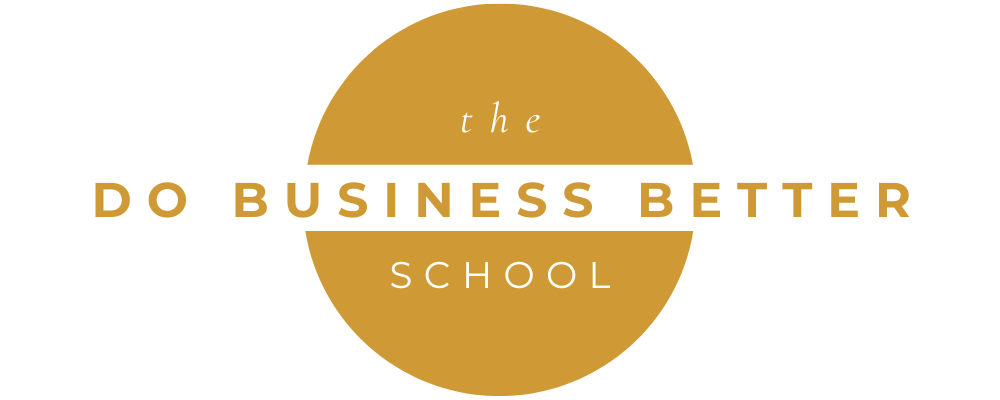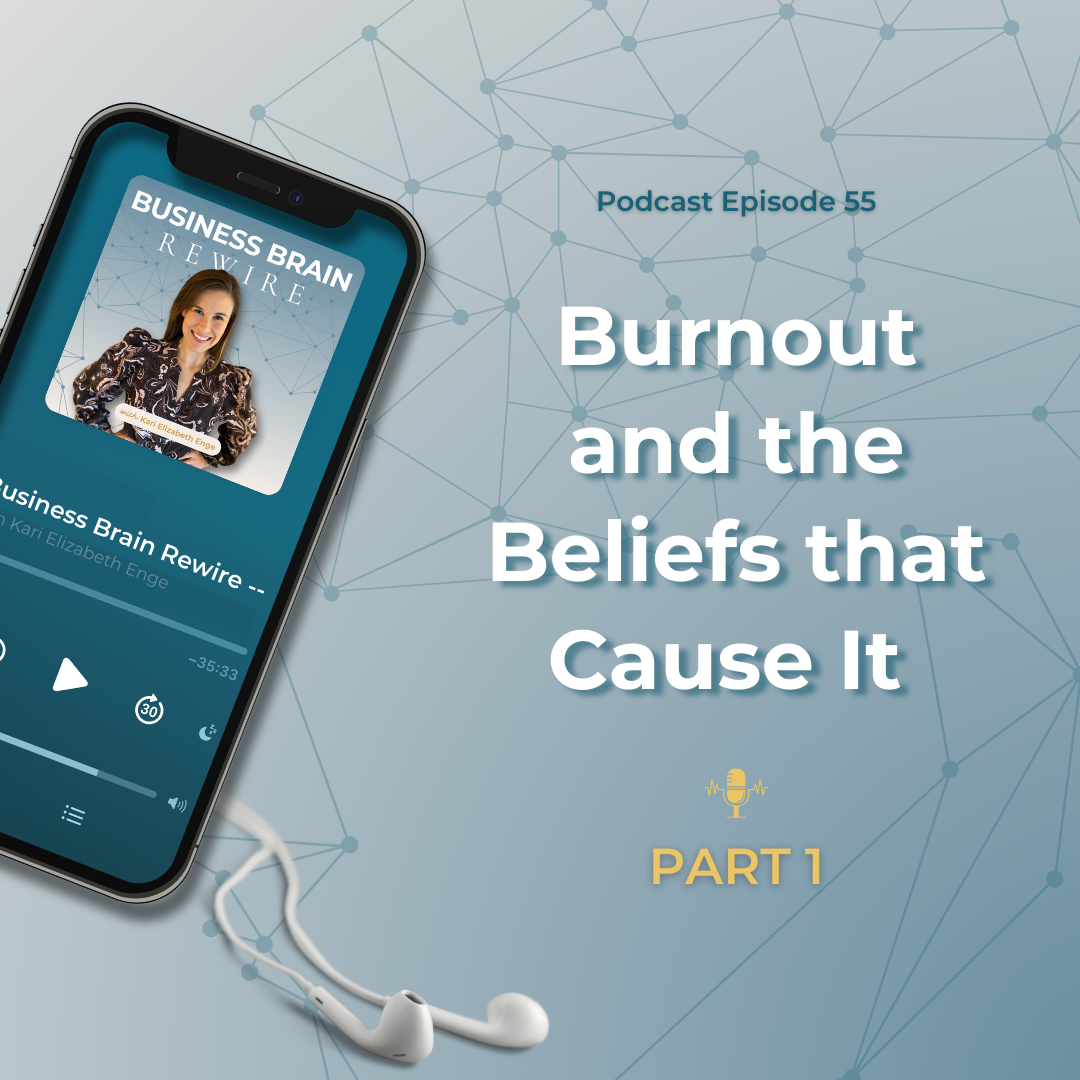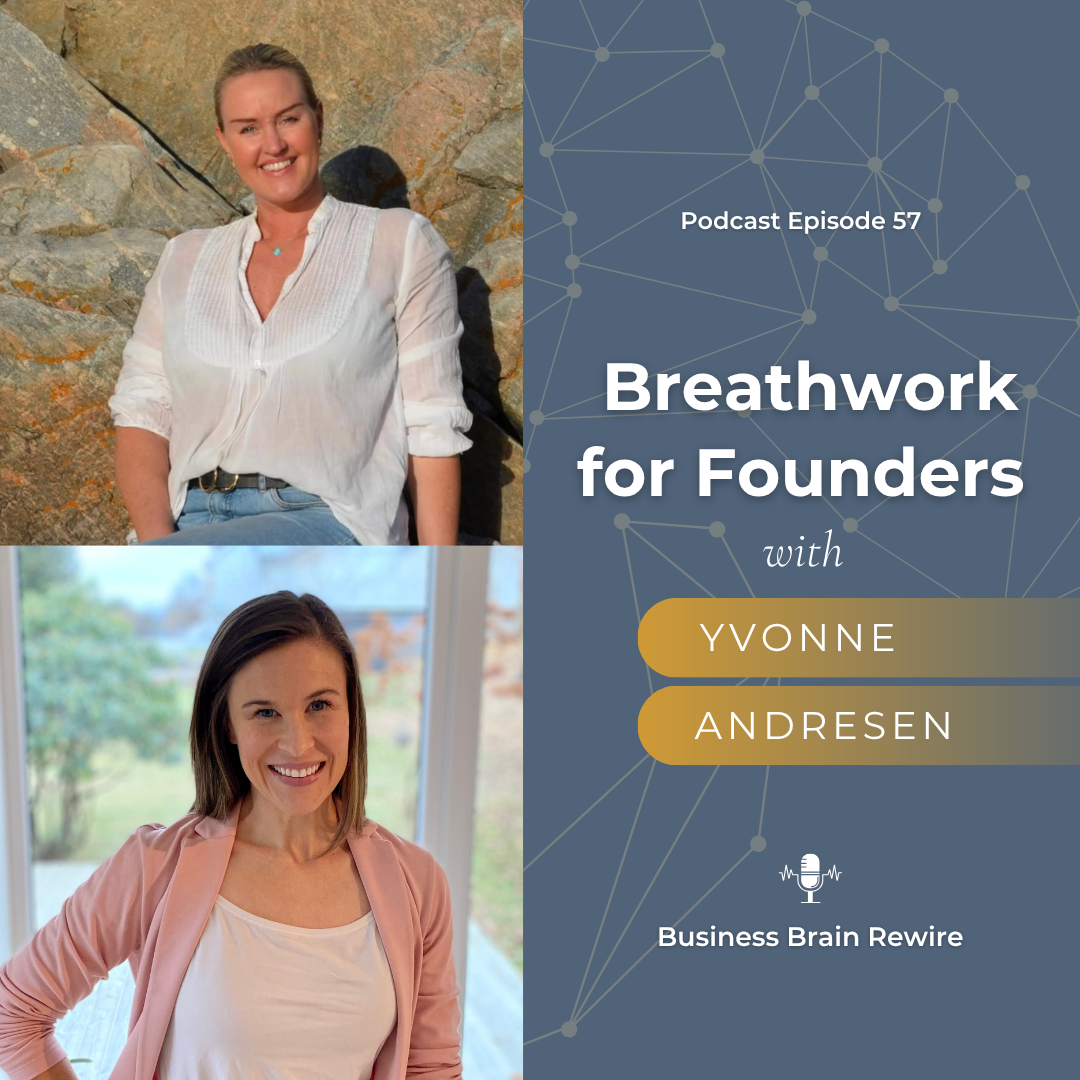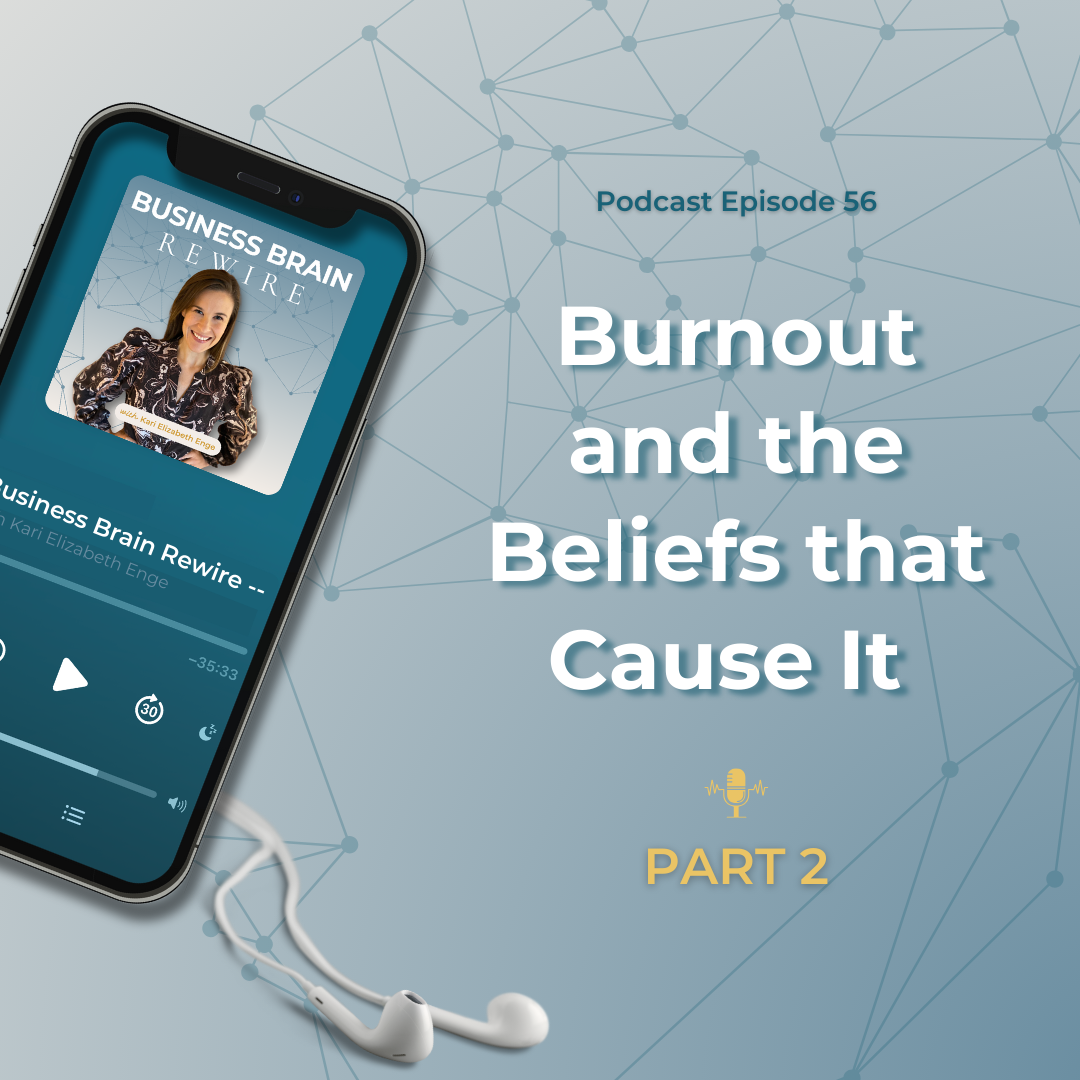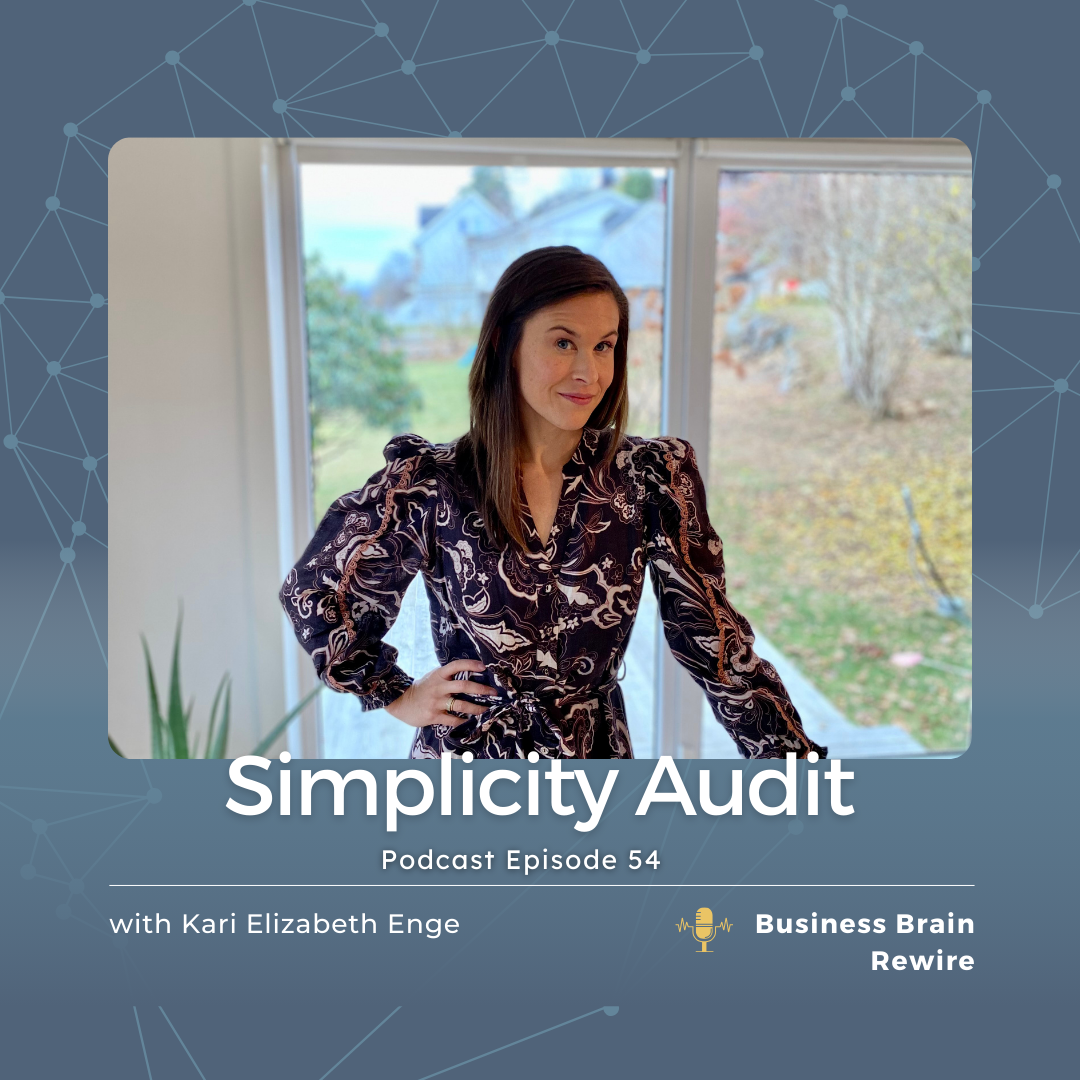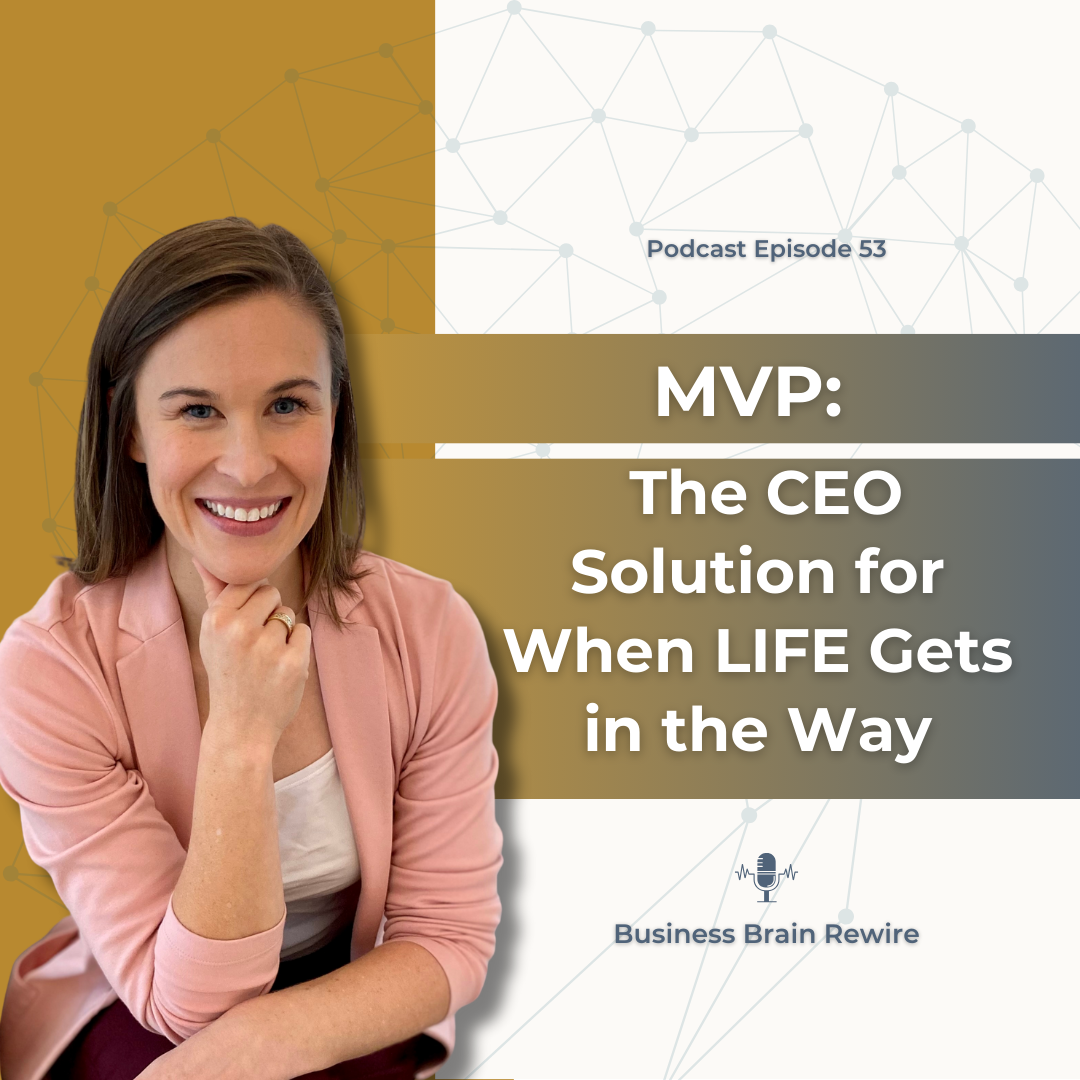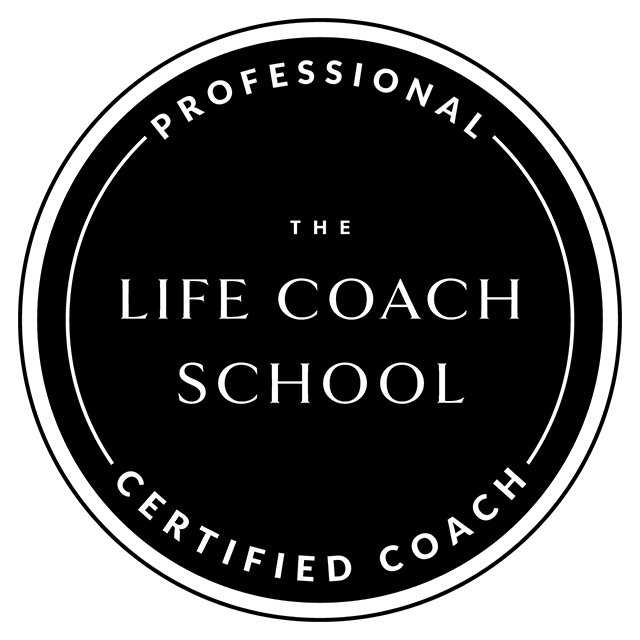Burnout isn’t something you have to live with as a founder.
If you’re an entrepreneur, chances are you’ve brushed up against burnout at some point. Maybe you’ve even heard the advice floating around that “you’ll never fully get over burnout – you just learn to manage it.”
I have to disagree.
Burnout is not a life sentence. It has a root cause. And when we address that root, we can eradicate burnout for good – while still building thriving, purpose-driven businesses that make a big impact.
Here’s the truth:
👉 Burnout doesn’t just make you tired: it blocks your capacity to grow in a sustainable way.
👉 The same root cause that leads to burnout often fuels overwhelm, anxiety, depression, and even physical pain.
👉 You don’t need more coping strategies – you need a complete reframe of what burnout actually is.
That’s exactly what I’m breaking down in today’s episode.
If you’ve been carrying the weight of exhaustion, stress, or that creeping sense of burnout (or even if you haven’t, but you’re wrestling with the symptoms), this conversation is for you.
In This Episode You’ll Learn:
- What burnout really is (and isn’t)
- Why most of us think about burnout all wrong
- How to identify and fix the root cause once and for all
🎧 Tune in now and let’s rewrite your relationship with burnout.
Important Links from Today’s Episode:
Transcript
[00:02:36] So of course you’re gonna be experiencing burnout, and if you’re experiencing burnout, you’re probably experiencing a whole lot of other issues in your business that we can actually solve. If you are ready to get out of burnout, if you are ready to stop feeling exhausted as an entrepreneur, if you’re tired of stress that builds and builds and builds and then suddenly hits you over the head like a sledgehammer, this episode is for you. Even if you don’t regularly experience bouts of burnout, I still really want you to listen into this episode because there’s other symptoms like overwhelm, general stress, depression, anxiety, physical pain, and even unwanted coping behaviors. They all can be caused by the same thing that causes burnout. So listen up. We’re gonna dig deep today. We’re gonna talk all about the things under the surface of burnout. So let’s go.
[00:03:29] To start off this conversation around burnout, I want to actually define and describe it because a lot of you have experienced burnout, but you’ve never actually put words to it. If you wanna start to do something about burnout, you need to do the same thing that we do with any other condition, right? We need to have awareness and acceptance of what we’re dealing with. So just kind of reigning this vague, ugly thing in defining it and kind of putting a box around it if, if you will, it can actually help you to start to get some control over what it is and how you wanna deal with it.
[00:04:07] Let’s define it. Burnout is a state of mental, emotional, and physical exhaustion caused by excessive and prolonged stress. It occurs when you feel overwhelmed, emotionally drained, and unable to meet constant demands. Now, this is the formal definition and there’s some important things that I wanna point out to you about this definition, and also I’m gonna dig deeper into this to tell you why, like just this definition on a surface level is not enough. The first thing about this definition that I do like is that it’s happening on three different levels. Your mental level, emotional level, and physical level. And I would say that it is in that order. So burnout starts mentally. Then you experience it emotionally. And then you experience it physically. You might not even realize that this progression happens. Like you might notice and actually realize, oh, I hit a burnout, when you are at the physical state, like when you literally feel tired, right?
[00:05:12] But, this is actually happening in a progression. First you have some mental thoughts, then you have a change in emotion, and then you have a change in your physical state. Right? So for example, when you’re burned out, you might feel like nothing is working. You might suddenly feel like you have a lowered sense of accomplishment or even a lack of motivation to remain active at the level you were previously, right? It’s this feeling or this thought that I just need to shut down where your mind, emotions, and body just kind of retracting from your business and maybe even, your life, right? It’s just screaming out: I need a break. This is not just a normal evening of relaxation or a weekend fun thing with the family to break up your normal routine. This is the feeling that you just can’t take it anymore. You need to hide away from everything for a period of time. That that period of time will arrange for every individual. During that time, your mind, emotions and body will all feel heavy and tired.
[00:06:12] Let’s look at what’s actually happening here, because as I mentioned, it’s a progression, but we need to understand how it starts and then what it leads to. Since we’ve already covered the fact that it starts on a mental level, we know that we need to look into the human brain and we know that it ends with the emotional level and the physical level, so we also need to look at the human body, right? Brain and body. And we need to start asking ourselves what is causing this reaction? And how is this reaction sort of playing out?
[00:06:42] A lot of people when they’re thinking about burnout, they’re like looking to the external circumstances. They’re saying, it’s because you have too much to do. It’s because you’ve packed your schedule too tight. It’s because you don’t have work life balance. You have a strenuous schedule, et cetera, et cetera. When you just look there, instead of looking to the entrepreneurial’s brain and the entrepreneurial’s body to start figuring out burnout, you’re actually approaching it entirely wrong. When we look at all of the studies and all of the data, what it shows us is that while like external circumstances and external factors, like for example, your schedule as an entrepreneur, while it does show up in access or in excess of people who are burned out, especially in entrepreneurs who are burned out, it’s also showing up in entrepreneurs who are not burned out. Why is that? Right?
[00:07:35] When we study entrepreneurs, we know that one entrepreneur will be able to carry a to-do list, so to speak, with much more ease than another entrepreneur. One entrepreneur will remain passionate, energized, physically vibrant, and healthy. They’ll have mental and emotional engagement for their personal life alongside their professional one, while another entrepreneur with the same quote unquote, load will struggle. They’ll feel stress tired, have bouts of anxiety, depression, and physical manifestations, right? They’ll experience physical symptoms like migraines and body aches.
[00:08:12] Why is this so what researchers and scientists have started to look at is they’ve looked beyond just the to-do list in the calendar, right? They looked beyond the external factors in the world and they started looking at the entrepreneur’s brain and body. Right? Because we know that it’s our brain and then how our body interacts with our brain that interprets all external factors, right? We interpret our world, we assign meaning to it, and then we interact with our behaviors because of the meanings we assign things. So they looked at the brain and the body of the entrepreneur and they looked at how they were assigning meaning and how they were experiencing emotion inside of their business.
[00:08:55] It’s so fascinating. One of the studies that I really love the most was covered by the Harvard Business Review, and I’ll actually link to it in the show notes, but I’ll tell you all about it, or at least a part of it here in this episode, they studied entrepreneurs with burnout, and what they discovered was that: the entrepreneur who experienced burnout thought very differently and interpreted both their business and their role inside of the business very differently than the entrepreneur who did not experience burnout. There were very subtle changes that happened when you made a subtle change to the mindset.
[00:09:33] For example, the one thing I wanna share with you today, the one belief or the one mindset that I want to share with you today, was something that they labeled as a destiny belief. A destiny belief for the sake of this study was when an entrepreneur thought that entrepreneurship for them was a calling or a destiny. They had sort of a fixed mindset. They thought either the business path they were on was right or wrong. They thought that their entrepreneurial success either meant it was like meant to be or not meant to be like if they succeeded or didn’t succeed. These entrepreneurs, with this rigid fixed destiny belief system, had much higher burnout rates than those with what they are calling a flexible mindset.
[00:10:27] Before I get into the flexible mindset, I want to also say that I see this destiny belief in purpose-driven entrepreneurs specifically, kind of manifesting itself in a slightly variated way. So for example, I see a lot of entrepreneurs who say, you know, it’s my destiny to solve this social issue. I feel a really big calling to solve this problem. And ultimately, when I’m talking to them on a deeper level, what I realize is that they actually feel very unsafe in the world. Before they ever even started out on their business, what kind of caused them to want to start their business in the first place was anxiety. Right? They felt very unsafe in the world. They saw a problem out there and they were not okay with it. But it’s not just that they wanted to contribute to that problem. They actually were in sort of a fight or flight mode already, right? They were already worried about climate change or racism or inequality or disease or all sorts of other social issues, right? Whatever the social issue is. At some level they feel some responsibility to solve that. They put the weight of it entirely on their shoulders in a way. A lot of times for the entrepreneur, this feels very valiant. It feels very noble. It feels full of positive activist energy, but it can be very deceiving because it can actually be an attempt to get out of a fight or flight, right? It’s a subconscious attempt to get some control back in your life. Think about it. If you feel very unsafe in the world and you feel like there’s a major issue that’s putting you at stake, your body is going to be in fight or flight. That’s how the human body is designed. And if you are doing something, you know, if you’re taking action, then that feels better than doing nothing. Right? If you are really worried and you feel out of control with what’s happening in the world.
[00:12:24] So I really want you to think about this for a moment, to ask yourself, honestly if there’s any part of this destiny belief that might be a part of your belief system or your way of thinking as an entrepreneur. Because let me tell you, it’s really sneaky and it’s really deceptive, and you can totally think that you are purpose driven and positive and contributing and doing your part and all of that, which I’m sure you are, but under the surface, there could be some attempt to bring control back, which we never have as humans. So really reflect on that and while you do, I want to describe to you the other way of thinking that the Harvard Business Review study found, which is the flexible mindset.
[00:13:03] An entrepreneur with a flexible mindset in this study was an entrepreneur who was passionate about their work. They really enjoyed it. They felt like their role fit them. So it fit their lifestyle, their creativeness, their skills, their talents, just their general like goals for their life. They were passionate about the craft that they were in. They liked how they could contribute to the world through it. But they actually didn’t believe that their current role was the only job that could do that for them, right? So they thought that, you know what? I really love what I do. I’m contributing. I’m having a positive impact. I’m finding meaning in this. I have a passion for it. But another role could probably do this for me as well. It was not rigid, it was not forced. It had no control. It was not part of their identity. In fact, these people could give it up easily and go on to do something else. Fascinating, right?
[00:14:04] So which one are you? Are you an entrepreneur who’s got a fixed mindset? Are you telling yourself a story or your business? Is it right? This is it. This is your destiny. This has to work and it has to work now. Right? Do you have to fix a problem you see in the world? Do you have to find a solution to this environmental problem or this social justice issue or this wrongdoing? Do you feel like almost a sense of urgency around that? If you do, you’ve just stacked the deck against yourself. So your belief system has basically just queued up your brain into a sense of urgency, and you just created stress in the body. Stress in your central nervous system that is completely fabricated by beliefs in the mind and really by your ego. Like you’ve basically just sent your body into a form of flight or fight or flight that will eventually lead you to burnout every single time you’re.
[00:15:03] You might be asking like, okay, but how does that actually lead me into burnout? How can you know me having a sense of urgency over solving a problem lead me to a busy schedule? What this rigid sort of destiny belief will do is it gives like almost subconscious instructions to your brain and your body that it needs to focus in hard. It’ll send it into overdrive because it’s in survival mode. It’s not in the type of energy that’s creative and flowing and fun and innovative and collaborative because it’s in a survival mode. It will be a sense of go, go, go. It will feel more rushed in a way. Your energy will feel rushed and everything will feel like it’s behind in your business. And all of the activities that you do and all of the busyness that you have when you’re in this drive almost, will feel very necessary, right? Your brain is really good at convincing you that what you’re doing is really needed, and it’ll be really convincing to you that it’s urgent, but actually a lot of it’s not right. You’ve just been duped by your own belief system. Basically, you’ve just given your brain instructions. Then now since you’ve told a story and you’ve given meaning to your brain about like how you’re operating in your business and what your business’s role is, then you now see the world through a filter. You see business strategies through a filter. You see business growth through a filter. Everything is filtered through this blurry lens.
[00:16:34] You’re gonna end up adding a lot of unneeded complexity. You’re gonna add a lot of unneeded like ness and heaviness around your business, which I see a lot in entrepreneurs. I wanna say that as you’re like listening to this, you might be thinking like, yeah, not like this a hundred percent of the time, but that’s very common. You’ll like vacillate between creative and flowing energy and then urgent rushed energy constantly. What it’ll do is that you’ll go, go, go burnout, and then you’ll recover. When you recover, that’s when you can get back into creative flowing energy. But of course, if you’ve got some belief systems that are putting you into overdrive, it’s just a matter of time before those start calling the shots, right? Probably day one of you back in the office, and then it only takes a period of time that’ll be different for everyone until you reach burnout again. All right, so when you are in this belief system, when you’re in this destiny belief system, this rigid belief system, you are gonna end up with a really busy schedule. You’re not gonna have as much time for your mental health, your physical health, your spiritual health, your hobbies, eating healthy, time with your loved ones or rest because your schedule will be filled with stuff that your brain is telling you is really needed, and it’s needed now for survival. Right?
[00:17:53] So what I want to offer you, is that this is not the right way to grow your business. You’re gonna be so much more effective. You’re gonna have so much more impact in the world. You’re going to grow your income so much more for that matter. If you can drop into a flexible mindset, if you can really think about the belief system that’s going to drive impact. Cause when I first talked to entrepreneurs about letting go of some control, releasing their identity from their business, not being in a rush. What they tell me is, yeah, but then I won’t get it done. It won’t get done. This won’t change. I won’t solve the problem. This injustice will continue to affect people. This wrongdoing will continue to happen.
[00:18:41] What I always tell them is, yes, you think that because you’re in survival mode and your brain is telling you that. But once you drop into creativity, innovation, collaboration, things that only a safe body and mind can do, you’re going to create such a better impact than if you are in fight or flight and survival mode. The flexible mindset that was referred to in the Harvard Business Review study was so brilliantly described to me, back several years ago when I did a interview for Rank and File Magazine with the founder and the CEO of Raven and Lily, Kirsten Dickerson. She described it as Palms Up. She described it as really being passionate about what she does. Really understanding that there were problems to be solved and wanting to be a part of that, but seeing that as an honor. Being a steward of that for as long as she was blessed with that opportunity. Really just opening up her fist, not clenching them, just opening up her palms and just letting it be there, but just willing to let it go at any moment if it was not for her anymore. If that was not part of her journey, or if someone else was going to take it on or grow it in a different way. She was just honored to be a part of that solution, and she knew that ultimately she didn’t have any control. Her faith in God was actually a big part of how she was able to do that because she was able to release control right to God to say, you know what? It’s not my responsibility to fix all the world’s problems. I can’t do that anyways as just a human, but you know what? I am so grateful and honored to be able to use my talents and my skills to advance your values, right? To advance goodness and love around the world, and I’m gonna do that to the best of my ability, but I have open hands. And that allowed her to make such a big shift in her business, right? Because when you have that mindset, your emotions change, right? Your emotions changed from rush into creative and flowing and innovative and collaborative. All the things that we need to grow in amazing business, right? When your emotion changes, your behavior changes, the decisions you make about the business and the day to day will look a lot different.
[00:21:20] So I know I’ve just dumped a lot of information for you to chew on, but this is just one of many beliefs that can contribute and lead to burnout. There are several others that I don’t have time for you today, and I’ll do some additional episodes really breaking them down. But I wanted to start with this one, this belief in what your role is as the entrepreneur in your business and whether or not you sort of have a rigid or a flexible view on that. I hope that you believe the Harvard Business Review studies and all the other studies that support this. I hope that Kirsten Dickerson and the founder of Raven and Lily’s approach to it with the open palm concept also really resonates with you as it does me.
[00:22:04] It’s such a lie that we tell ourselves that we need to be controlling and that we need to be rushed in order to make an impact in the world. It’s just absolutely ridiculous and it actually is counterintuitive, right? When we release some of the control and we don’t make it about ourselves, we’re able to serve so much better. I also hope that this shows you that burnout is not a symptom of what’s going on in your schedule? It’s not a symptom of a loaded calendar because you overdid it last month. It runs deeper than that. It’s a belief in a mindset problem that then manifests itself in certain emotions and certain behaviors that ultimately lead to burnout. It’s not isolated, so I don’t want you to treat it like. You just need to work harder at finding more balance, and you need to work harder at changing your schedule and keeping it in check, right? We need to look at the root cause, which is our thinking. And then we really need to understand how it affects and interplays with our emotions and our body.
[00:23:09] Start there, you guys. As you’re trying to overcome burnout, ask yourself if you’ve got a rigid destiny belief system or if you’re flexible. If you’ve got that open palm approach to your business. If you’re holding your business with clenched hands, then you’re always going to end up being a task master over doing it. But when you open and release it, you’re going to get rid of that rushed controlling energy, and you’re gonna be able to get rid of a lot of the hustle and a lot of the busyness and a lot of the complexity and a lot of the stuff on your to-do list that you think is necessary, but really isn’t.
[00:23:53] So are you willing to get a little uncomfortable and to start asking yourself some questions about how you view your role in your business? Are you willing to go there? Are you willing to ask yourself if this is partly about control and partly something that you don’t think you could give up, let go tomorrow. Think about it. Just this reflection is such a huge step on the way to solving burnout. I am going to be doing part two of this episode in the next few weeks, so I hope that you’ll tune into that. I’m gonna continue talking about burnout and the beliefs that cause it, because as I mentioned, there are several other ones that can contribute to you ultimately ending up wanting to just run away from everything. Stay tuned for that.
Podcast: Play in new window | Download
